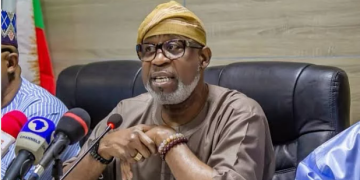By Jane Okafor, Abuja
The Federal Ministry of Health and Social Welfare has cautioned Nigerians against excessive salt consumption, also urging them to seek accurate health advice only from qualified professionals.
The advice came on the heels of a viral video where Pastor Chris Oyakhilome, the Founder of Christ Embassy Church and President of Believers’ Loveworld, advocated increased salt intake.
In the controversial video, Pastor Oyakhilome told his congregation that Africans have been “deliberately discouraged” from consuming salt in order to increase their dependence on sodium-based medications.
“They told you not to take salt so that you can buy their drugs—drugs that contain sodium,” he said to a cheering crowd. “Salt is not your enemy.”
The Daily Crucible reports that the popular Nigerian preacher, author and televangelist holds a Doctor of Divinity PhD Divinity/Ministry, 2008 – 2010 (Benson Idahosa University), MTh Theology and Pneumatology,1998 – 2000(Bethel Bible Institute) and Bachelor of Architecture – BArch Architecture,1987-1993 (Ambrose Alli University, Ekpoma, Edo State).
However, reacting to the cleric’s viral video, the health ministry, through the Deputy Director of Information and Public Relations, Alaba Balogun, harped on moderation in salt consumption.
It said that while sodium is essential for bodily functions, moderation is key.
It, therefore, recommended a daily salt intake of no more than 5 grams (about one teaspoon) and highlighted the risks of excessive consumption, including high blood pressure, stroke, heart failure, and kidney disease.
The ministry which is implementing a national sodium reduction strategy, urged Nigerians to seek accurate health advice from qualified professionals.
The statement reads: “The Federal Ministry of Health and Social Welfare has observed a widely circulated video in which a respected religious leader discourages Nigerians from heeding medical advice on salt consumption. While we deeply respect the important role of faith and religious leaders in our society, it is crucial to correct misinformation that poses a risk to public health.
“Salt is not the enemy. Salt contains sodium, an essential mineral that supports vital body functions such as nerve activity, muscle movement, and fluid balance. However, the concern lies in excessive consumption, not in salt itself.
“In line with global best practices, the World Health Organization (WHO) and the Nigerian Government recommend a maximum of 5 grams of salt per day (about one teaspoonful). Going beyond this threshold increases the risk of preventable disease and death.
“Research shows that most Nigerians consume more than double the recommended daily sodium intake. This excessive intake is a major contributor to high blood pressure, stroke, heart failure, and kidney disease—non-communicable conditions that continue to claim thousands of lives annually.
“To address this growing health crisis, the Ministry is implementing a comprehensive national sodium reduction strategy. This includes the launch of the National Sodium Reduction Guidelines, which aim to reduce sodium content across all food categories—from processed and packaged foods to meals prepared at home or sold in restaurants and by street vendors. This initiative mandates food manufacturers, regulators, and the public in lowering sodium intake without compromising quality and nutrition.
“We wish to state clearly: Doctors do not lie. Nigeria’s health professionals are trained to offer evidence-based guidance rooted in decades of scientific research and patient care. The presence of regulated sodium compounds in certain medications is not equivalent to dietary salt (sodium chloride) and is safe when prescribed appropriately.
“We reaffirm that faith and science are not at odds—they can and should work together for the well-being of our people. We therefore urge Nigerians to seek accurate health advice from qualified medical professionals and to join hands with the Ministry in reducing the burden of preventable diseases.”









































